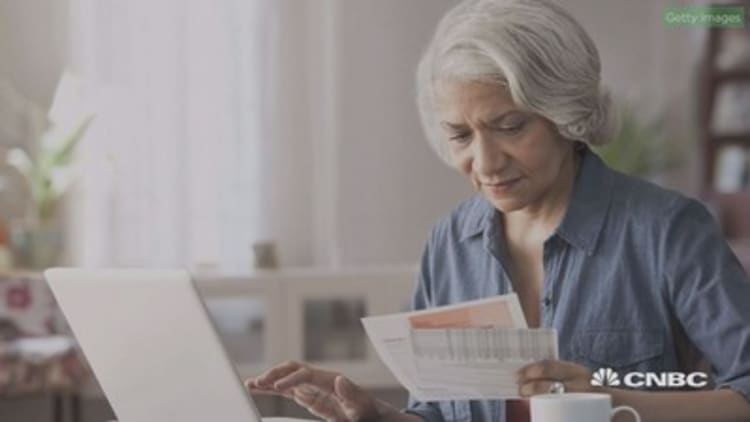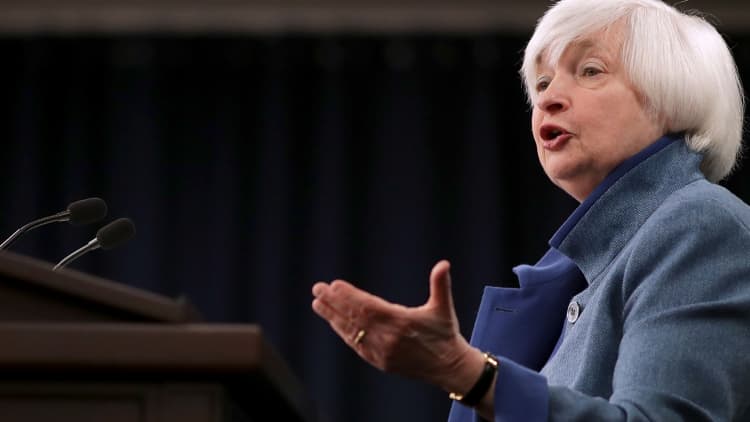
If you're a borrower, you're going to pay, and if you're a saver, you're not going to get paid — such is the nature of interest rate hikes.
With the Federal Reserve set to raise its benchmark rate Wednesday, the effects will be immediate for some, not so much for others.
Those with revolving debt could see increases in their payments within 60 days. Homeowners with adjustable-rate mortgages will get hit when their loans reset. Savers, though, aren't likely to get much benefit for quite a while.
"If the Fed hikes rates three times this year, that could make your next payment a doozy," said Greg McBride, chief financial analyst at Bankrate. Borrowers are "going to start to notice, and the cumulative effect becomes significant."

For example, a homeowner with a $200,000 mortgage could see a payment increase of close to $60 a month, he said, while those with larger loans could see increases of $100 or $150 depending on how quickly the Fed moves.
As things stand now, the Fed is on track to meet that expectation for three hikes. Central bank officials indicated in December that three would be likely for 2017, and the market is currently pricing in March, June and December as the most likely time for increases.
McBride said the first borrowers to be affected will be credit card holders and those with home equity lines of credit. They will be the ones who will see a payment impact with 60 days, as credit companies adjust to a new prime rate.
The prime rate currently sits at 3.75 percent and will be adjusted almost immediately after the Fed announces its increase. Credit companies use the prime as a baseline for what they charge customers — generally the prime plus a certain level.
For savers, though, it's a different story.
You better shop around
Much has been made over the burden that holders of plain-vanilla savings accounts and certificates of deposits, as well as pensioners, have felt in the low-rate environment.
Savings accounts these days pay on average 0.11 percent in interest, with 1.25 percent the high end, according to Bankrate. One-year CDs are paying about 1.24 percent.
Banks like higher rates because historically they push margins higher. However, they can be loath to pass those benefits on to customers.
"If you're just hunkering down at your financial institution and expecting better returns to land on your lap, you're going to be disappointed," McBride said. "Banks have not increased rates of returns on deposits, and they're not in a hurry to do so."
That makes it all the more important to be a good shopper when deciding where to park your money.
"The (banks) inclined to increase deposit rates (are) the ones already paying the most competitive returns," McBride said. "Not only are you getting a notably higher rate ... you're still protected by federal deposit insurance. That's as close to a free lunch as you're going to find."
McBride also advises cardholders with high balances to deal with them now.
After all, the Fed is expected to hike not only three times this year but also three more times in 2018, and to keep going until it takes the funds rate up to about 3 percent. The current rate is 0.5 percent to 0.75 percent.
"If you have variable-rate debt, it's going to be a significant exposure to rising interest rates," McBride said. "Grab those zero-percent credit card offers now while you still can. There are zero percent offers that extend as long as 21 months. That gives you a great window of opportunity to get your credit card debt paid off once and for all."
Interestingly, rather than pay down debt while rates are rising, many people use it as an opportunity to borrow more — to lock in lower rates before they go up.
"Borrowing goes up in the year after a Fed rate increase," said Steve Rick, chief economist at CUNA Mutual Group. "People try to get in before rates go up even more. People who put off buying a car or a durable good — an appliance, a big-screen TV — think, I better buy it now and put it on my credit card."
However, Rick noted that some credit card companies are using adjustable rates now, putting those making new purchases in a vulnerable position now that rates are rising again.



